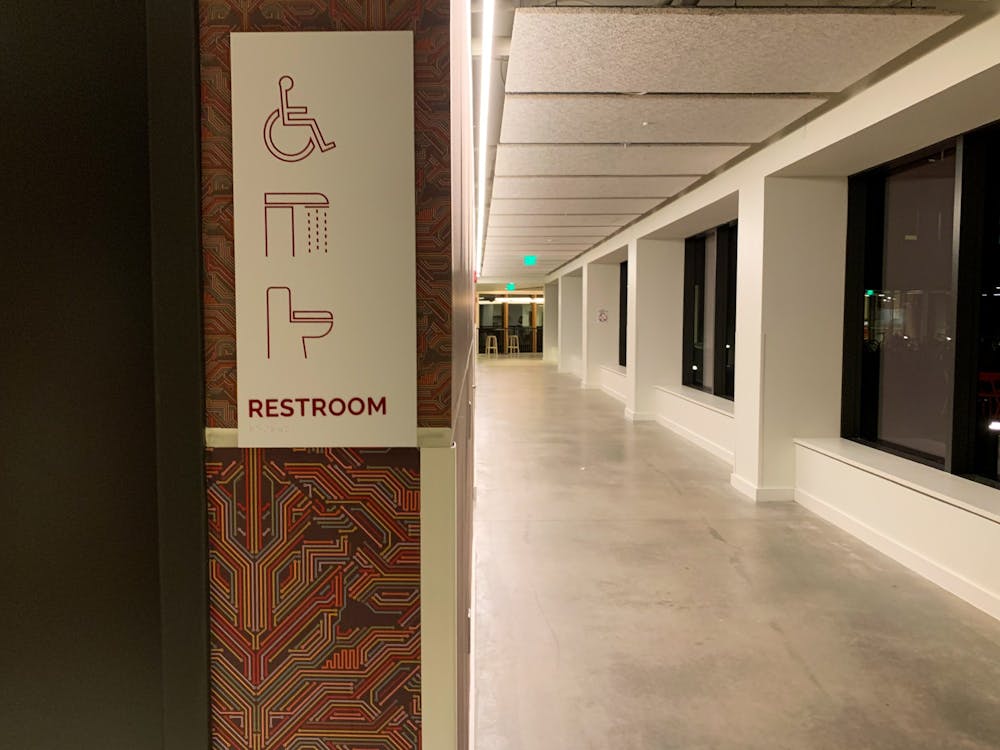Amid the rise in anti-trans legislation proposed to target trans communities across the country, as well as growing political opposition surrounding access to gender-affirming healthcare, it’s more important than ever for Princeton to support transgender and gender-diverse students. As an institution committed to representing a diverse community, Princeton can and should implement strategies that benefit these students' physical and social well-being.
The University has taken various steps towards making campus a more inclusive space for queer students, including increasing the number of gender-neutral bathrooms across campus. However, requests for housing accommodations on the basis of gender identity and bathroom access remain a difficult process to navigate.
The initial barrier to providing gender-diverse students with gender-neutral bathroom access is residential college assignments, especially for incoming first-years who are randomly assigned to residential colleges. On housing forms, incoming students can elect gender-inclusive housing, which makes it possible for them to be housed with students of other genders. However, despite potentially having access to gender-inclusive housing, these students are not guaranteed access to gender-neutral bathrooms, which is a very important concern for many transgender people who value access to bathrooms that affirm their gender identities.
Similarly, as was eloquently suggested in a column by Columnist Julianna Lee discussing gender-neutral bathroom accessibility on campus last year, students identifying within the gender binary may feel unsafe sharing bathrooms with transgender students, especially if existing single-gender, communal bathrooms were to be converted into gender-neutral bathrooms. However, this argument fails to make space for trans-identifying and gender-diverse students who, based on bathroom availability, may feel unsafe sharing single-sex spaces depending on their varied and diverse needs. This is particularly true for those who have medically transitioned. Scars from these medical procedures may require additional treatment and resources that would make access to single-user gender-neutral bathrooms even more important for these students. This is especially the case when these scars signal transness, which may not be positively received and may result in experiences with transphobia.
Senior Columnist Ndeye Thioubou’s recent column on hijabis’ experiences with bathrooms and religious practices at Princeton calls for accommodations to be made for students whose religious beliefs require access to single-gender spaces. The solidarity we must extend to our fellow Muslim, and otherwise religious, students in honoring these requests, must also be extended to trans students who request access to gender-neutral bathrooms. Both groups of students are disproportionately affected by negative media representations, through transphobia and Islamophobia, and are hence already more likely to be discriminated against. Thus, they should be prioritized as groups to protect here on campus. The highly academic environment at Princeton is difficult enough to navigate without the added stress of feeling unsafe in bathrooms, an environment where students are already vulnerable, even without the added concerns surrounding their identities.
We must be receptive to the concerns voiced by cisgender students and protect their spaces and communities. We must also create adequate accommodations and an accessible accommodation application process for students needing bathroom and housing accommodations related to religious observances and beliefs, as Thioubou’s piece suggests. But, we must also include transness and the recognize the current anti-trans political climate in the discussion, recognizing that gender-diverse students are also a vulnerable group. We must consider all of these very diverse perspectives when determining the positive effects new policies and construction can have on the student community. Single-user gender-neutral bathrooms are the best option for keeping all students safe, regardless of gender or religious identity (as Thioubou similarly suggests), and for building an inclusive campus where our diverse student body can be in community.
It’s unrealistic to suggest that all bathrooms on campus be converted into gender-neutral bathrooms, especially considering the large amount of construction already occurring on campus. Hence, my suggestions for approaching this issue and supporting gender-diverse and trans-identifying students while also considering needs presented by cisgender students are as follows: provide an easily accessible single-stall gender-neutral bathroom in every building, and include access to gender-neutral bathrooms when honoring requests for gender-inclusive living assignments — which should be granted immediately upon request.
Providing an easily accessible single-stall gender-neutral bathroom in each campus building, following New Jersey state requirements, would largely increase gender-diverse students’ comfort levels across campus. Princeton has proven that this is architecturally and logistically possible, considering these already exist in Whitman’s Lauritzen Hall and across New College West and Yeh College. Further, allowing students to select gender-inclusive living spaces and truly honoring those requests to the highest level possible would ensure that students can view Princeton as an immediately welcoming environment, in a similar way that bathroom-accessibility applications in room draw processes later in their Princeton career would.
Allowing trans students access to gender-neutral bathrooms will not entirely remove the effects of transphobia. However, accessing gender-neutral bathrooms will make gender-diverse students more comfortable in an already high-stress environment. Princeton must make gender-neutral bathroom access more comprehensive for gender-diverse students, and must ensure that all groups, including religious students, are able to access accommodations related to intersectional identities. These changes must be implemented now.
Emilly Santos is a junior from London, England, studying Medical Anthropology, minoring in Global Health & Health Policy, Gender & Sexuality Studies, and Korean Language & Cultures.





